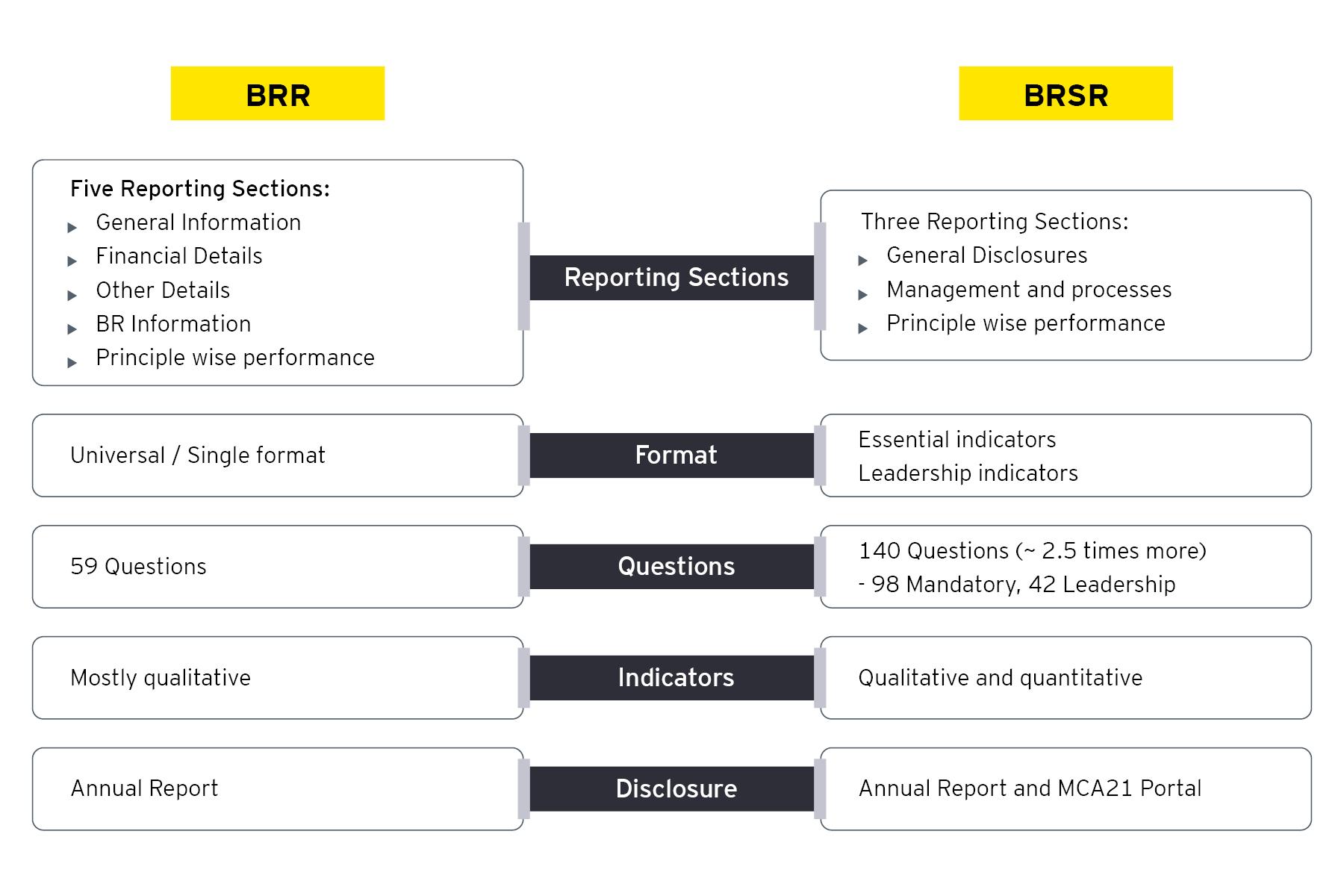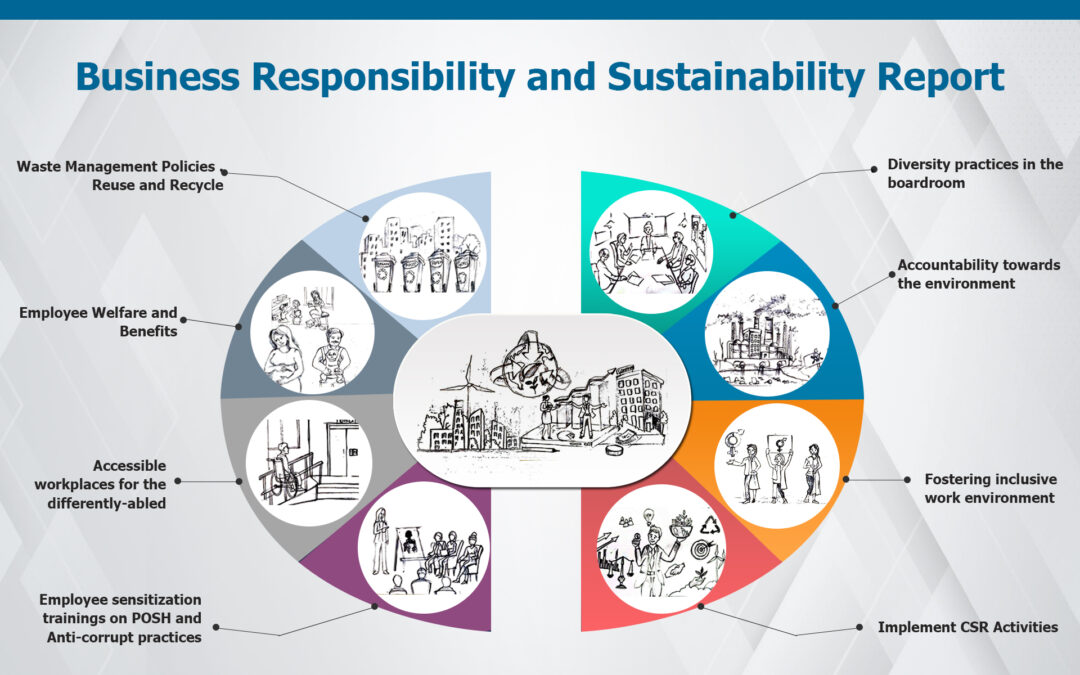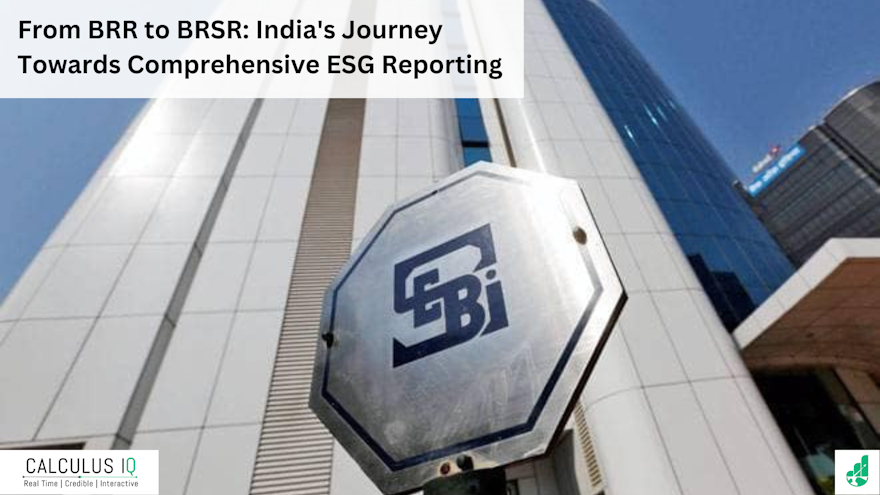Introduction
In this article, we delve into the Business Responsibility and Sustainability Report (BRSR), a framework for environmental, social, and governance (ESG) reporting in India. BRSR represents a significant evolution from its voluntary guidelines issued in 2009 by India's Ministry of Corporate Affairs.
The framework is designed to enhance sustainability disclosures and promote transparency and accountability among Indian companies.
BRR to BRSR: The Shift Towards Comprehensive ESG Reporting
India's journey towards comprehensive Environmental, Social, and Governance (ESG) reporting has been marked by significant progress and evolution. The foundation for ESG regulatory frameworks and disclosures was laid with the introduction of the Business Responsibility Reporting (BRR) guidelines by the Ministry of Corporate Affairs (MCA) in 2009. BRR served as a stepping stone for the development of a broader and more comprehensive ESG reporting framework, eventually leading to the creation of the Business Responsibility and Sustainability Report (BRSR) in 2021. BRR played a crucial role in paving the way for BRSR by providing a starting point for ESG reporting in India. Over the course of a decade, the reporting landscape matured, necessitating a more robust and refined framework to meet the complex ESG disclosure requirements and global quality standards prevalent in today's sustainable reporting arena. In 2012, the Securities Exchange Board of India (SEBI) introduced the requirement of ESG reporting, designating it as the Business Responsibility Report (BRR). Initially, the mandate applied to the top 100 listed companies in India by market capitalization. However, as the significance of ESG reporting grew and the need for a comprehensive framework became evident, BRR evolved into the Business Responsibility and Sustainability Report (BRSR) in 2021.
The transition from BRR to BRSR marks a significant shift towards comprehensive ESG reporting in India. BRSR offers a unified and more encompassing approach to ESG disclosures, catering to the dynamic requirements of the sustainable reporting landscape. The updated framework effectively addresses the gaps in reporting accuracy and depth, aligning with global best practices. Key Differences between BRSR and BRR (BRR vs. BRSR):

Source: EY
The Securities Exchange Board of India (SEBI) has developed the new BRSR, designed to align with globally accepted reporting frameworks like the Global Reporting Initiative (GRI), Sustainability Accounting Standards Board (SASB), and the Task Force on Climate-Related Financial Disclosures (TCFD).
Set to come into effect in 2023, the BRSR mandates Indian companies to provide quantitative metrics on sustainability-related factors, further strengthening India's commitment to sustainability.
Understanding the Three Main Disclosure Areas
The BRSR reporting format comprises three key sections:
General Disclosures: This section gathers essential company information, such as office locations, products, services, and employee-related details. It provides a baseline understanding of a company's size, listing exchanges, and its stakeholder engagement activities.
Management and Process Disclosures: Focused on higher-level policy and management processes, this section aims to showcase a company's adherence to the National Guidelines on Responsible Business Conduct (NGRBC). Boards and directors are required to demonstrate the approval and enactment of policies aligned with time-bound company goals.
Principle-wise Performance Disclosures: This section presents quantitative data relating to the nine principles outlined in the NGRBC. The disclosure format includes both essential indicators (mandatory) and leadership indicators (voluntary) to measure a company's impact on environmental and social metrics.
The Nine Principles Underpinning the BRSR
The Business Responsibility and Sustainability Report (BRSR) encompasses nine core principles with corresponding disclosure requirements:
- Integrity: Companies should uphold ethical, transparent, and accountable conduct. Key performance indicators include anti-corruption and anti-bribery policies, details of regulatory actions, and conflict-of-interest complaints.
- Sustainable Goods and Services: Businesses should provide sustainable and safe products and services. Performance indicators encompass investments in environmental and social impacts, reclamation procedures, and extended producer responsibility plans.
- Employee Well-being: Respect and promote the well-being of all employees, including those in value chains. Performance indicators include health and accident insurance coverage, paternity benefits, accessibility for differently-abled workers, and the percentage of unionized workers.
- Stakeholder Responsiveness: Businesses should respect the interests of all stakeholders and be responsive to their needs. Performance indicators include engagement with vulnerable and marginalized groups, communication channels used, and details of consultation processes.
- Human Rights: Companies should respect and promote human rights within their operations. Performance indicators include employee training on human rights issues, payment of minimum wage to workers, and board and management remuneration relative to industry medians.
- Environmental Protection: Respect and make efforts to protect and restore the environment. Performance indicators encompass electricity and fuel consumption trends, water withdrawal from various sources, air emissions measurements, and environmental impact assessments.
- Responsible Public Policy Engagement: Businesses should engage responsibly and transparently in public and regulatory policy. Performance indicators include affiliations with trade and industry associations, details of issues related to anticompetitive conduct, and advocacy for specific public policy positions.
- Inclusive Growth: Companies should promote equitable development and inclusive growth. Performance indicators include social impact assessments, details of rehabilitation and resettlement projects, and procurement policies favoring marginalized or vulnerable groups.
- Responsible Consumer Engagement: Engage with and provide value to consumers in a responsible manner. Performance indicators encompass consumer complaint and feedback mechanisms, details of safety-related product recalls, and the existence of cybersecurity and data privacy policies.
With India transitioning to mandatory ESG reporting, the BRSR aims to enhance compliance, consistency, and communication regarding non-financial disclosures, promoting responsible and sustainable business practices.
Moving Towards a Comprehensive Reporting Landscape
As of June 2023, the Business Responsibility and Sustainability Report (BRSR) framework has grown to encompass 140 questions, divided into 98 essential indicators and 42 leadership indicators. The shift towards mandatory ESG reporting through BRSR is a strategic move to foster a more responsible and sustainable business landscape in India.
By mandating this comprehensive reporting framework, companies are encouraged to take proactive steps in setting ambitious sustainability-related targets, outlining their achievements in environmental, social, and governance dimensions, and showcasing their dedication to responsible business practices. Through the BRSR, businesses are prompted to delve deeper into their ESG performance, identifying areas for improvement and innovation. The comprehensive questionnaire facilitates a thorough assessment of their operations, ensuring they address key sustainability challenges, mitigate risks, and seize opportunities aligned with global sustainability agendas.
Embracing the BRSR empowers companies to align their strategies with the Sustainable Development Goals (SDGs) set by the United Nations, promoting inclusive and equitable growth while respecting human rights and preserving the environment. By disclosing potential risks and opportunities in their sustainability journey, companies can demonstrate their commitment to long-term value creation, stakeholder engagement, and sustainable growth.

Source: Lexplosion
Furthermore, BRSR fosters transparency and accountability, enabling stakeholders to make informed decisions based on reliable and standardized ESG disclosures. This robust reporting mechanism serves as a catalyst for transformative change, inspiring companies to integrate sustainability into their core operations and adopt best practices that drive positive social and environmental impacts.
As businesses embrace the BRSR, they become integral drivers of India's sustainable development journey, contributing to a resilient economy that balances profit with purpose. By leveraging the power of comprehensive ESG reporting, companies can elevate their reputation, enhance investor confidence, and be recognized as responsible corporate citizens committed to building a sustainable future for all.
Conclusion
The Business Responsibility and Sustainability Report (BRSR) marks a significant milestone in India's journey towards comprehensive Environmental, Social, and Governance (ESG) reporting. The framework represents a pivotal shift from voluntary to mandatory ESG reporting, aiming to improve compliance, consistency, and communication of non-financial disclosures among Indian corporates. By embracing the BRSR, companies are encouraged to set ambitious sustainability targets, outline achievements, and disclose potential risks and opportunities in their sustainability journey.
Transparency and accountability are at the core of the BRSR, empowering stakeholders to make informed decisions based on reliable and standardized ESG disclosures. This shift towards comprehensive reporting elevates Indian corporates to be responsible drivers of sustainable development, fostering a resilient economy that balances profit with purpose.
As India aspires to achieve its net zero goals and make meaningful progress in the global sustainability landscape, the BRSR plays a vital role in guiding companies toward a more sustainable future. By embracing this reporting framework, businesses contribute to India's commitment to sustainability, and together, they forge a path toward a greener and more prosperous nation for generations to come.
![[object Object]](/lib_ubcXiSgTRmkLVyyT/k8w528b9mk1p20to.png?w=400)
